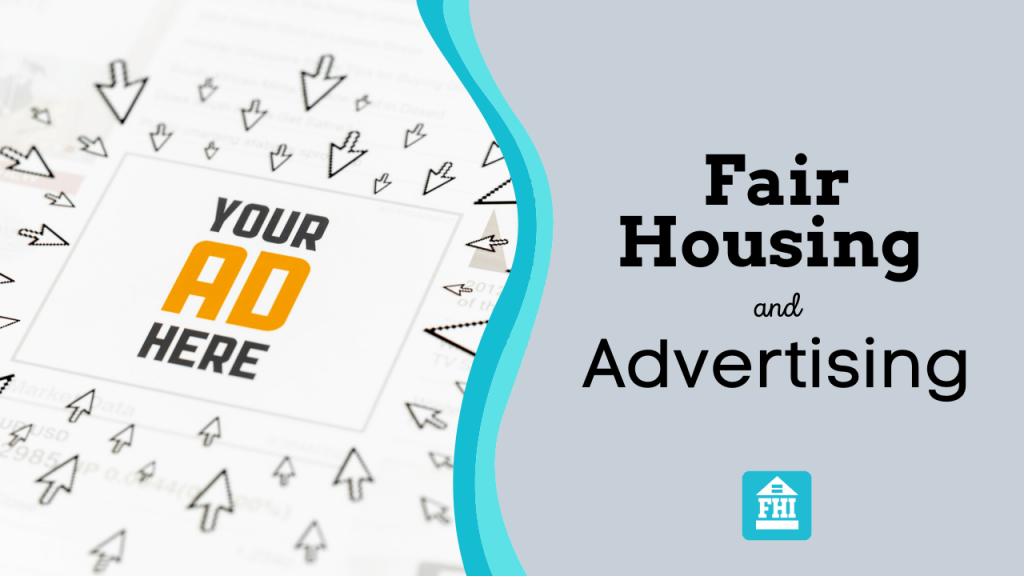
Fair Housing advertising guidelines are a must when developing your marketing and advertising content. Fair Housing issues and violations are more common than you may think. HUD provides advertising guidelines for compliance which this article covers.
In case you’re asking yourself why you should read this particular article, the fact is that if you work in the housing industry, you need to know your responsibilities under the Fair Housing Act, because regardless of your position, you are probably “advertising” every day. Fair Housing advertising involves every member of your team.
Take a moment and please subscribe to our YouTube Channel
Fair Housing Advertising Media
Advertising under the Fair Housing Act doesn’t just mean ads in newspapers. The law says you can’t “make, print, or publish. . . any notice, statement, or advertisement . . . that indicates any preference, limitation, or discrimination based on a person’s race, color, religion, sex, handicap, familial status, or national origin.” That includes such things as applications, flyers, brochures, deeds, signs, banners, posters, billboards, and even pictures in your office.
It also means that the things you say about your property in writing, over the phone or in person are covered. Expressing an illegal preference or limitation to one of your fellow agents, brokers, employees, prospective sellers, renters, or to any other person in connection with the sale or rental of your property is illegal. Here are two examples of illegal advertising that you may not have realized were violations of the Fair Housing Act.
A maintenance man tells a passer-by that “only real Americans” lived in the apartment complex where he worked.
A rental office is decorated with many large pictures of the residents participating in the community’s facilities and amenities such as exercising in the weight room, swimming, and playing volley ball and tennis. However, all of the pictures are of white, young, “yuppies;” none of the pictures shows children, or persons of differing races or nationalities.
As you can see it does not take much for a statement to be taken out of context or representation to be misinterpreted.
Policies and Procedures
Condominiums, apartment complexes and mobile home parks that have written rules and regulations have always been fertile breeding grounds for Fair Housing advertising violations. (How many condominium documents still prohibit anyone under 16 years of age from living there, although that kind of “statement” has been illegal for many years?)
The lesson here? Wipe the dust off of your policies and procedures and make sure they are up to date with current Fair Housing advertising regulations.
Phrases and Words To Avoid
The law says you can’t use “words, phrases, photographs, illustrations, symbols or forms of any kind” which tend to give the impression that your property is available (or not available) only to certain types of people. Believe it or not, it is still fairly common to see a “no children, no pets” ad. “No pets” is okay; “no children” is not. It is also illegal to advertise for a “Christian roommate,” or to indicate any other type of religious preference.
HUD provides Fair Housing advertising guidelines as to what is acceptable in Fair Housing advertising. While advertisements cannot state a preference or limitation based on race or color, statements such as “master bedroom” and “desirable neighborhood” are not illegal. And while religious discrimination is illegal, using words like “kosher meals served on the premises,” or including phrases such as “Merry Christmas” or “Happy Easter” in an ad is not discriminatory either.
Fair Housing Advertising Words and Phrases List – Complimentary Download
There are even words that are restricted when it comes to people with disabilities. Obviously statements such as “no wheelchairs” are illegal. However, using phrases such as “great view,” “walk-in closets” or “walk to bus stop” is acceptable. There are certain “buzz” words you should still avoid. These are words or phrases that have been associated with discriminatory practices in the past. They include such words as “restricted,” “exclusive,” “limited,” and so forth.
A related article you may enjoy is entitled: Reasonable Accommodation – Accommodating Residents With Allergies
The “good news” is that HUD will consider your use of certain kinds of advertising words and slogans to be evidence of your compliance with the Fair Housing Act. For example, using HUD’s “Equal Housing Opportunity” or fair housing logo in your ads will be viewed with approval. Displaying a fair housing poster in your office is another way to advertise in a positive manner. Incidentally, to put one more rumor to rest – use of the logo is not required.
Another way to produce positive advertisements is to vary the use of human models in your ads so that both majority and minority groups in your community, both sexes, persons with disabilities and, when appropriate, children of all ages are represented.
Fair Housing Advertising – The Bottom Line
Fair housing advertising need not be a scenario that causes you unnecessary anxiety. Education and Fair Housing training are an absolute must. Reinforce this training with regular reminders via your weekly calls, company newsletter or something similar. The more interactions that your team members have with residents and prospective residents, the more you want to provide them with positive reminders. You can easily make Fair Housing so scary that it can turn your team into cold robots. Allow them to be human and friendly but with clear and concise direction.
If you or your team are in need of training be sure to check out our Fair Housing online course information.
